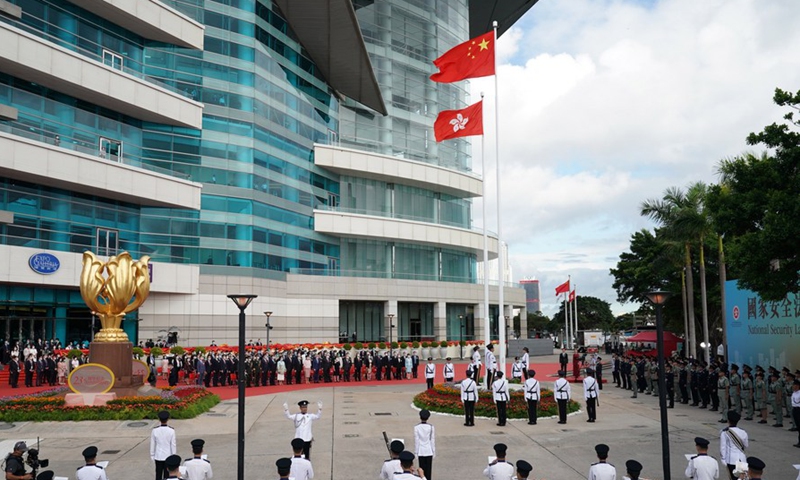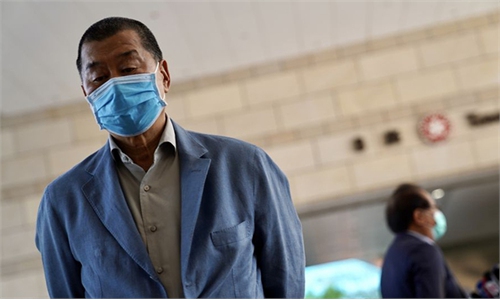
A flag-raising ceremony is held by the government of the Hong Kong Special Administrative Region to celebrate the 23rd anniversary of Hong Kong's return to the motherland at the Golden Bauhinia Square in Hong Kong, South China, July 1, 2020. Photo: Xinhua
In his first policy address delivered in October, Hong Kong's Chief Executive John Lee Ka-chiu highlighted the importance of advancing national security education in Hong Kong. Recently, the National Security Education Centre of the International Probono Legal Services Association (IPLSA), a non-profit organization registered in Hong Kong, launched a national security education instructor training program, and more than 100 people have obtained the qualifications to become instructors who will teach national security knowledge in Hong Kong's primary and middle schools as well as in other institutions.
Several people who participated in the training course told the Global Times that young people in Hong Kong are the key targets for promoting and popularizing the National Security Law for Hong Kong, and deepening their understanding of the national security concepts and related laws will help them establish a correct understanding of national identity.
The graduation ceremony for the first batch of trainees was held recently, and Junius Ho, founder of the IPLSA told the Global Times that more than 100 people from legal, social welfare, educational and business sectors had signed up for the training. After studying and testing, a total of 117 were qualified as national security instructors, accounting for 80 percent of the total trainees.
The three-week training covers three major parts: 16 areas relevant to the overall national security concept, the country's Constitution, the Basic Law, the National Security Law for Hong Kong and basic legal knowledge; lectures based on current news; and lectures related to national security by members of the Legislative Council.
Au Yeung Po Chun, chairlady of the Women Service Association, attended the training. She told the Global Times that the training gave her a new understanding of the national security concept. In particular, she realized that national security is not only related to politics and the military, but also to various fields such as ecological security, resource security and technology security.
"I plan to explain national security-related knowledge to different groups of people at least one time a day in the future, seizing every opportunity to promote these ideas," she said.
During the ceremony, Chief Secretary for Administration Eric Chan Kwok-ki said that since the implementation of the National Security Law for Hong Kong, there have been significant changes in Hong Kong society, which has been transitioning from chaos to order. However, anti-government rioters will not easily give up, so Hong Kong should remain vigilant and effectively safeguard national security by preventing, prohibiting and punishing acts endangering national security.
The official also emphasized that young people are the future of Hong Kong, and they are also the key targets for promoting national security education. The HKSAR government will push forward multiple ways of promoting national security, inside and outside the classroom, jointly enhancing awareness among students and teachers.
Several trainees reached out to by the Global Times after the ceremony mentioned the plan of using schools as key platforms for sharing and teaching national security knowledge.
Chu Wai Ming, retired principle of Chung Sing Benevolent Society Mrs. Aw Boon Haw Secondary School told the Global Times that during the social turmoil in 2019, he saw that many young people had weak understanding of national security and it is necessary to rebuild this concept for them in various ways.
The future education in this area needs to be accurate and we need to communicate with young people with correct ideas. "If there are misunderstandings, we need much more time to correct it," he said.
A previous IPLSA survey on Hong Kong's national security education showed that Hong Kong teachers lack sufficient national security knowledge, and certain teachers are still resistant to national security education. There are possibilities for "loopholes" in education and for incorrect methods. The organization has proposed to the Education Bureau that schools provide at least 6 to 10 hours of relevant training courses for teachers and students every school year.


